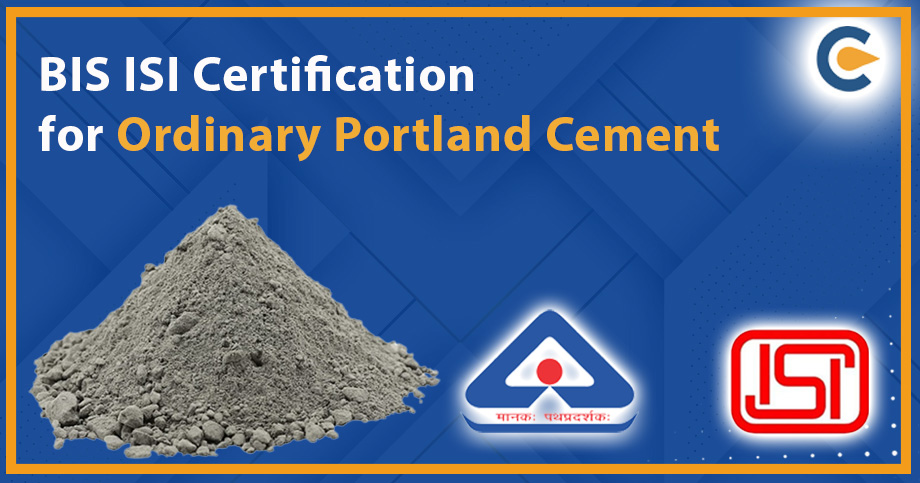Ordinary Portland Cement (OPC) is one of the most extensively used types of Cement. It is used for usual construction purposes where special properties are not required, such as bridges, buildings, and pavements & where soil conditions are normal. This type of Cement has great resistance to cracking & shrinkage but has less resistance to chemical attacks. All Ordinary Portland Cement has been included in the ISI Certification Scheme under IS 269:2015. This product cannot be manufactured, imported or sold in the Indian Market without obtaining BIS ISI Certification for Ordinary Portland Cement. Ordinary Portland Cement must meet the chemical & physical requirements specified in the Standard. The Manufacturer must ensure that the Cement meets the requirements of this Standard. This blog will discuss how to get BIS ISI Certification for Ordinary Portland Cement in India.
What is the Role of BIS in India?
The Bureau of Indian Standards or BIS is a National Standards Body promoting & regulating standards of products & goods in India. BIS, or the Bureau of Indian Standards, has set up 8 Central, 4 Regional & 3 branch labs in India to test the product samples during the surveillance & preliminary operations. The BIS Certification for products is encouraged by the Government for the following purposes:
- It provides a safeguard for public health;
- It safeguards the customer from hazardous products
- It provides quality assurance;
- It promotes customer confidence.
Benefits of Obtaining BIS ISI Certification for Ordinary Portland Cement
The following are the benefits of obtaining BIS ISI Certification for Ordinary Portland Cement:
- It ensures quality standards as BIS Registration of any products is bound to follow a standard while manufacturing the products;
- BIS Certification is issued after testing the products samples in BIS-certified labs, ensuring quality inspection & high-quality products;
- This Certification gives authenticity to BIS-certified products as they deliver high-quality performance & reliability;
- BIS-certified products minimise environmental risks as the Bureau of Indian Standards has prohibited the usage of certain chemicals & materials under its prescribed norms.
Various Tests for Ordinary Portland Cement
The following test shall be carried out as per the method prescribed:
- Fineness;
- Compressive Strength;
- Insoluble Residue;
- Transverse Strength Test;
- Loss of Ignition;
- Soundness;
- Setting.
A lab must be sufficiently maintained for the various tests to be performed as per the methods specified in the Standard. The Manufacturer must demonstrate that the Cement meets the requirements of this Standard.
Packing, Sampling, and Marking of Ordinary Portland Cement
Packing:
- The Cement shall be packed in any of the following bags:
- Jute sacking bag conforming to IS 2580;
- Jute synthetic union bags conforming to IS 12174;
- Lightweight jute conforming to IS 12154;
- HDPE or PP woven sacks conforming to IS 11652;
- Multi-wall paper sacks conforming to IS 11761;
- Any other approved composite bag.
- Supplies of Cement in bulk may be made by arrangement between the Purchaser & the supplier (Manufacturer or stockist);
- When Cement is intended for Export & if the Purchaser so requires, packing of Cement may be done in drums or bags with a net quantity of Cement per bag or drum as agreed to between the Manufacturer & the Purchaser.
- For this purpose, the permission of the Certifying Authority shall be obtained in advance for each export order.
- The terms For Export and the new quantity of the Cement per drum or bag shall be clearly marked in an indelible link on each bag or drum.
- The packing material shall be as agreed to between the Manufacturer & the Purchaser.
Marking
- Each bag of Cement shall be legibly & indelibly marked with the following:
- The name of the Manufacturer & their registered Trademark;
- The words Ordinary Portland Cement, 33 Grade;
- Net quantity in Kg;
- The words use no hooks;
- Control or batch unit number in terms of the week, month & year of packing;
- Manufacturer address;
- Type & percentage of performance improver(s) added, in case of addition of performance improvers;
- Similar details shall be provided in the delivery advice accompanying the shipment of packed or bulk Cement & on cement drums.
Sampling
- A sample or samples for testing may be taken by their presentative or Purchaser or by any individual appointed to superintend the work for the purpose of which the Cement is needed by the latter’s representative.
- In addition to the requirements of the above point, the methods & procedure of sampling shall be in accordance with IS 3535.
- The samples shall be taken within 3 week of the delivery & all the tests shall be commenced within 1 week of sampling.
- When it’s not possible to test the samples within 1 week, the samples shall be packed & stored in air-tight containers & tested at the earliest but not later than 3 months from the receipt of samples for testing.
- The supplier or the Manufacturer shall afford every facility & shall provide all labour & materials for taking & packing the samples for testing the Cement & for subsequent identification of the Cement sampled.
Documents Required for BIS ISI Certification for Ordinary Portland Cement
The following are the crucial documents required for obtaining BIS ISI Certification for Ordinary Portland Cement:
- The address proof of the manufacturing plant;
- The Factory Layout;
- Copy of Company’s Bank Statement;
- Details of the raw materials being used for cement manufacturing;
- Identity proof of the Manufacturer;
- Proof of Establishment of the Business such as Certificate of Incorporation in case of Companies, Partnership Deed in the case of a Partnership Firm & PAN Card in case of a Sole Proprietor;
- Detailed information regarding factory staff such as name, experience & qualifications;
- A flow chart showing the entire manufacturing process;
- Id proof of the AIR (Authorised Indian Representative) for Foreign Manufacturers only;
- Details of the equipment used for testing;
- Certified copy of the reports from BIS-certified labs;
- Copy of Company’s Bank Statement.
Procedure for BIS ISI Certification for Ordinary Portland Cement
Following is the procedure for BIS ISI Certification for Ordinary Portland Cement:
Step 1: Selecting the Product Code: First, the Manufacturer needs to identify and choose the ISI Standard Product Code for their product.
Step 2: Filing Application: After that, the next step is filing the application online. For that, the applicant needs to properly fill out the BIS Application Form. Moreover, the applicant must pay the Registration Fee and Audit Fee for further inspection.
Step 3: Inspection of the Factory Premise or Unit: Once the applicant file the application correctly, then the Inspection Team and BIS Officials will visit the factory premise or the Manufacturing Unit/Premise of the applicant and examine the quality control and manufacturing process. The BIS Officer or inspection officer will collect some products as samples and send them for testing in a BIS-certified lab.
Step 4: Submission of Test Report: It is vital to submit the product sample report from the BIS Certified labs and submit to the Bureau of Indian Standards.
Step 5: Grant of BIS ISI Certificate: Once the application and inspection process is completed, then the BIS issues a BIS ISI Certificate.
Reasons behind the Rejection of the BIS ISI Application
Following are some vital conditions which, if not complied with the Standards, then the Bureau of Indian Standards will reject the application of BIS ISI Certification for Ordinary Portland Cement:
- If the product’s samples are not submitted for testing after submitting the application for BIS ISI Certification;
- If the firm has not submitted the correct documents;
- If there is a failure on the Manufacturer’s or applicant’s side to provide assistance to visiting BIS Officials during the factory premise visit;
- The firm/the applicant is involved in unethical practices or illegal practices;
- If there are lack of facilities for testing of the product by the Manufacturer.
Conclusion
As mandated by Law, it is vital to get a BIS ISI Certification for Ordinary Portland Cement[1] as it not only ensures safety and quality standards but is also required if a Manufacturer wants to import, Export, and sell Ordinary Portland Cement in India.
Read Our Article: An Overview of BIS ISI Mark for Cement Manufacturers













